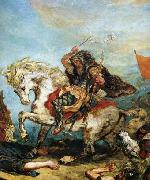Wholesale Oil Painting No Minimum |
|||||||||||
|
|
|||||||||||

|
|||||||||||
|
|
|
||||||||
Eugene DelacroixFrench Romantic Painter, 1798-1863 For 40 years Eugene Delacroix was one of the most prominent and controversial painters in France. Although the intense emotional expressiveness of his work placed the artist squarely in the midst of the general romantic outpouring of European art, he always remained an individual phenomenon and did not create a school. As a personality and as a painter, he was admired by the impressionists, postimpressionists, and symbolists who came after him. Born on April 28, 1798, at Charenton-Saint-Maurice, the son of an important public official, Delacroix grew up in comfortable upper-middle-class circumstances in spite of the troubled times. He received a good classical education at the Lycee Imperial. He entered the studio of Pierre Narcisse Guerin in 1815, where he met Theodore Gericaul |
||||||||
|
|
||||||||
Attila and his Hordes Overrun Italy and the Arts
Attila and his Hordes Overrun Italy and the Arts Painting ID:: 62857 |
1843-47 Oil and virgin wax on plaster Bibliotheque, Palais Bourbon, Paris Delacroix decorated the walls of the library of the Palais Bourbon: two great semidomes eleven metres by eight situated on either side of the room. Delacroix decided to decorate them with allegorical subjects, one representing barbarity, Attila and His Hordes Overrun Italy and the Arts, and the other civilisation: Orpheus Civilizes the Greeks. There were in addition five little domes or bays, which would present the divisions adopted in all libraries, while not following the classification too exactly: Sciences, Philosophy, Legislation, Theology and Poetry. By making such a striking contrast between his two allegorical subjects, Delacroix contrived to symbolise War and Peace, the two poles of human conduct. Artist: DELACROIX, Eugene Title: Attila and his Hordes Overrun Italy and the Arts (detail) , painting Date: 1801-1850 French : historical 1843-47 Oil and virgin wax on plaster Bibliotheque, Palais Bourbon, Paris Delacroix decorated the walls of the library of the Palais Bourbon: two great semidomes eleven metres by eight situated on either side of the room. Delacroix decided to decorate them with allegorical subjects, one representing barbarity, Attila and His Hordes Overrun Italy and the Arts, and the other civilisation: Orpheus Civilizes the Greeks. There were in addition five little domes or bays, which would present the divisions adopted in all libraries, while not following the classification too exactly: Sciences, Philosophy, Legislation, Theology and Poetry. By making such a striking contrast between his two allegorical subjects, Delacroix contrived to symbolise War and Peace, the two poles of human conduct. Artist: DELACROIX, Eugene Title: Attila and his Hordes Overrun Italy and the Arts (detail) , painting Date: 1801-1850 French : historical |
|||||||
|
CONTACT US |

